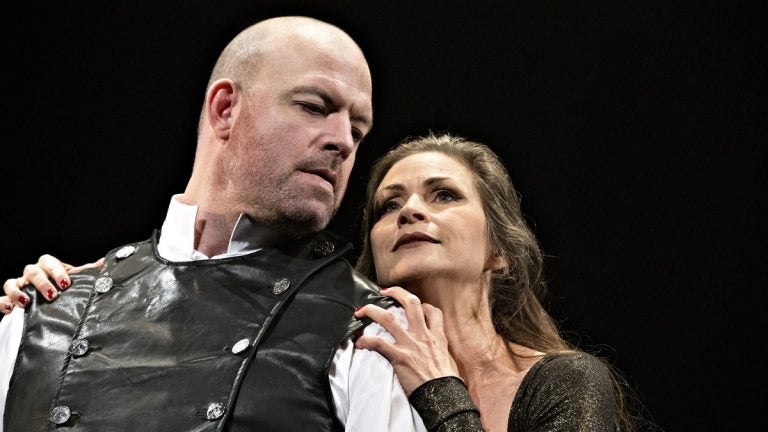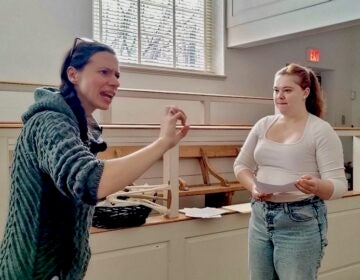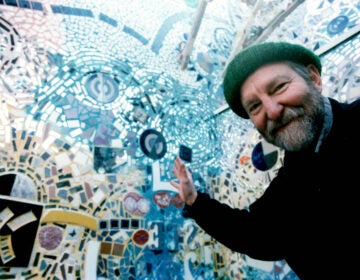Review: The ambitious ‘Macbeth’

Ian Bedford as Macbeth and Susan Riley Stevens as Lady Macbeth in the Pennsylvania Shakespeare Festival production.(Photo courtesy of Lee A. Butz)
Even for “Macbeth,” the current production at the Pennsylvania Shakespeare Festival is dark and stark – often beautifully so. Its design – the lighting, the set, the costumes, the general feel – is in black and white, but mostly black, a striking reflection of the play’s lack of nuance that would at the least provide shades of gray.
Patrick Mulcahy’s production has a pulsating intensity without letup. Even a scene usually played for comic relief, when a drunken porter (Suzanne O’Donnell) admits two visitors to Macbeth’s house moments before they will discover bloody mayhem, carries an undertone of fear and loathing. Lady Macbeth (the superb Susan Riley Stevens, so angular and tough she hardly looks herself) is not only mad with ambition from her first lines, she’s mad, period, long before she turns into a crazed sleepwalker toward the play’s end.
In Ian Bedford’s muscular delivery, Macbeth himself is a full-speed-ahead vehicle for aggression. Mulcahy’s judiciously edited script seems to contain all Macbeth’s second-guessing about his wife’s plan to murder the king, but in this production the hesitance seems fleeting – an almost forgettable what-was-I-thinking? moment.
And the witches – those three weird sisters? Mulcahy cuts out their short initial scene, when Shakespeare indicates through them that the supernatural is a leading force in the plot. He begins instead with news: Macbeth has been a hero in battle and will be much rewarded with new power.
But we get to the witches (O’Donnell in a second role, plus Deanna Gibson and Eleanor Handley) right after that, and they are staged to be both spooky and menacing.
The production has its curiosities. The wonderfully creepy sound design by Matthew Given can’t overcome the staging when the witches spout important but fuzzy-sounding prophecies with their backs to the audience. Bob Phillips’ gripping bare-boned set design has the witches and the ghost of murdered Banquo (a fearsome Anthony Lawton) rise and fall from a grate at the front of the stage, and dark chain-link mesh scrims to the rear provide pathways, exits and back-framing for the action. Yet when the soldiers fighting Macbeth stand behind those scrims, they carry nothing of the tree-branches that are supposed to shield them and figure prominently into the storyline.
Mulcahy, the astute producing artistic director of the Pennsylvania Shakespeare Festival, appears to aim for minimalism in the production but at the same time, for a maximized delivery of the text. When Macbeth and his lady conspire early on, their lines are equally wild with anticipation and horror, approaching melodrama. When Macbeth philosophizes after hearing of his wife’s death – “tomorrow and tomorrow and tomorrow” – he’s a showboater. It’s a moving rendition of the iconic passage by Bedford, who puts the brakes on the play’s cadence to deliver it.
You could argue with these judgments in the production – for me, the “tomorrow” speech also had the effect of giving itself unnecessary quote marks – but you can’t argue for long. This is a thoroughly ambitious “Macbeth” with all its bloody cylinders firing. The main supporting players – Jacob Dresch as Malcolm, the king’s eldest son; Carl N. Wallnau as the ill-fated king and later, the doctor vexed by Lady Macbeth’s sleepy illusions; Perry Ojeda as a brave Macduff – all neatly fit into the intensity of Mulcahy’s vision.
Lisa Zinni’s costumes are bold and rich in their darkness – they make you want to run out and get yourself something in relaxed black leather. The lighting by Thom Weaver throws large shadows when called for and brings a witch’s brew alive.
There’s no fighting until the bitter end, but it’s crucial. Mulcahy staged the fight, which is blunt and precise. That also defines, in its severity, this “Macbeth.”
_“Macbeth” runs through August 3 at the Pennsylvania Shakespeare Festival, on DeSales University Campus, 2755 Station Avenue in Center Valley, a few miles north of Quakertown. The same cast is performing Ken Ludwig’s farce “Lend Me a Tenor” in repertory with “Macbeth.” 610-282-9455 or www.pashakespeare.org.
WHYY is your source for fact-based, in-depth journalism and information. As a nonprofit organization, we rely on financial support from readers like you. Please give today.




